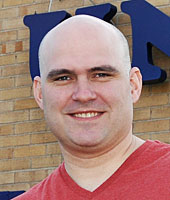Losing a job can be a massive blow-- or the best thing that ever happened to you.
Despite the recession, some people who get laid off land on their feet, or even thrive. Losing a job can spur people to try something they’ve always wanted to do — make a career change or strike out on their own. More than a quarter of those laid off in the first six months of 2010 who hadn’t found jobs considered starting their own businesses, according to a CareerBuilder.com survey.
Certainly, layoffs can be devastating for some, especially blue collar workers or older employees. Whether a person will rebound after a layoff depends partly on their background, according to Linda K. Rolie, author of Getting Back to Work: Everything You Need to Bounce Back and Get a Job After a Layoff and CEO of Career Services, an Oregon-based outplacement services company. Clients who make the transition smoothly, she says, tend to have a college degree and “significant amount of work-life experience” that they can transfer to another field. Getting a buyout or a severance package doesn’t hurt either.
Some second-lifers even exact a bit of psychic satisfaction: After she was laid off from her brand development job in 2007, Marlo Scott used the opportunity to start a popular “cupcake, wine, and beer bar” in Manhattan. The name: Sweet Revenge.
Here are four other Americans who endured losing their jobs — and now thank their former employers for giving them the boot. It’s a satisfying twist on the familiar unemployment story.
Brad Kuhn, 48
It was the last day of his vacation — Friday the 13th, October 2009 — when Brad Kuhn’s boss called him into the office. “I just knew,” Kuhn says. “You don’t call somebody in from vacation for a meeting.” His company, CNL Financial Group in Orlando, Fla., which sold real estate investment trusts, was laying him off from his job as senior corporate communications manager. The next day, he made 30 phone calls and subsequently applied for at least 20 corporate jobs, he says. He got one interview and no offers. It was his first experience with unemployment — in 25 years, he’d always been recruited into his next job. 
As a stopgap, he started picking up freelance communications work — first for a local nonprofit, then for a public utility. Clients kept coming: an adventure canoe racer who wanted to publicize his book; a commercial debt-restructuring company. He realized that he didn’t need his old employer to make a living. Today, he has eleven clients and employs six freelancers. He says he earned just under $100,000 in his corporate job, and this year he’s is on track to nearly double that. Kuhn likes that he can work from anywhere, has returned to rowing (which he did competitively in college), and has time to organize social bike rides in his neighborhood. His layoff, he says, was “the best worst thing that ever happened to me.”
Jen Watkins, 30
Jen Watkins was the managing editor of the twice-weekly newspaper Today in Dixie, located in St. George, Utah, when she — and the rest of the paper’s staff — was laid off in July 2010. A single mother of two, she’d just gone through several surgeries to remove cancerous cervical cells and couldn’t afford to keep her health insurance. Even though the newspaper industry was in free fall, Watkins didn’t want to give up journalism. She started an online site, The St. George News, investing some of her own money for startup costs and using volunteers. Launching her own publication was tough on her personal life: She says she was in a committed relationship that broke up earlier this year, in part because of differences over her startup dreams. 
The same month she launched her site, however, the town’s other paper, The St. George Spectrum, put up a pay wall. That drove readers to her site, which grew from 60,000 monthly hits in August 2010 to 115,000 in March, 2011. That got the attention of KZNU, the local Fox News radio station, which bought the site for $6,000 at the end of March and gave Watkins a job as the station’s morning show co-host. Now she’s on the air in the morning and writing content for the paper and the radio station in the afternoon. She says she’s making more money than she was as a managing editor, though she won’t give specifics. “Getting laid off was by far the greatest thing that’s happened to me,” she says.
Jeff Stone, 51
Before being laid off in November 2009, Jeff Stone had spent 25 years at auto parts maker Delphi in Flint, Mich. Adelphi had warned him in August of that year that he’d be let go; one of his last assignments was to sell off company equipment. Stone had always wanted to go into business for himself and he started looking into franchise opportunities. In October, he spotted a Sears Corp. ad in a local paper, seeking someone to start a Hometown Store franchise (a smaller version of the chain’s department stores). 
Along with his older brother, Tim, who had taken an early retirement package from General Motors, he bought the franchise in his hometown of Fenton, Mich., along with another one in nearby Howell. Going into retail in the teeth of the recession was gutsy, but the brothers had run very conservative projections before investing and figured they could survive. They put in 12- to 14-hour days five or six days a week at the beginning. “It was pretty overwhelming,” Stone says. “Early on, there was a lot of ‘why are we doing this, this is crazy’.” But the Fenton store has beaten their projections, the Howell store has equaled them, and the brothers have bought a third Sears franchise. Stone has matched the $80,000-a-year salary he earned at Delphi. His Fenton store has created six new jobs.
Chris Studer, 31
Chris Studer got a message from his boss on a Friday afternoon in December 2008. He was at the television station in Sioux Falls, S.D., where he worked, and had just finished taping the two shows that he anchored. His boss told him he’d like to talk to him the following Monday. Several co-workers had been given similar messages, so he knew what was coming. Studer didn’t tell his wife right away — he was the family’s sole earner, and they had three small children. But on some level, when the layoff came, it was something of a relief — his job anchoring the station’s morning and midday shows involved an 11 p.m. to 7:30 a.m. shift. Three days in, it hit him: “I don’t have a job.” 
He started frantically putting out resumes and was surprised to be called in for an interview at the South Dakota Farmer’s Union. Three weeks later he started as the organization’s communications director. Studer feels good about his new employer — the union advocates for farmers statewide, most of them small family operations — and he likes wearing jeans and t-shirts to the office. “Being able to help real people is nice, [rather than] just talking to a teleprompter every day,” he says. He says he makes more money than he did in television (though he says he’s not allowed to give exact numbers) and has his health insurance paid for, unlike in his old job. He’s not bitter about his former employer. “They couldn’t have done me a bigger favor,” he says.
Related Links:
Third Time’s a Charm for Two Young Entrepreneurs. (The Fiscal Times)
Reinventing Your Career after Being Laid Off (ABC News)
How to Stop Feeling Angry after a Layoff (USNews.com)





